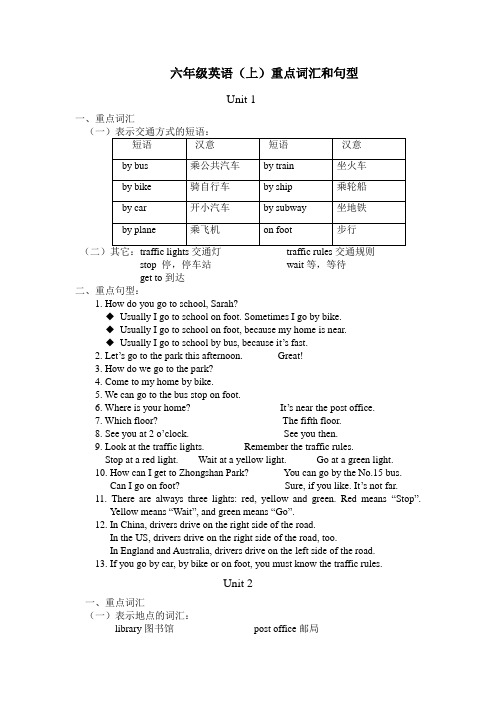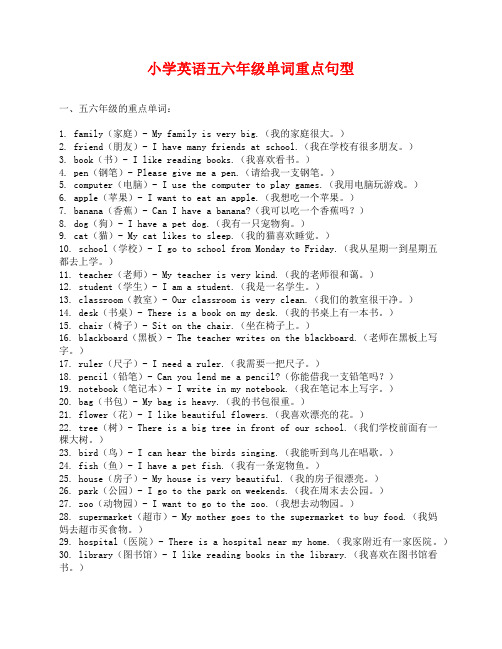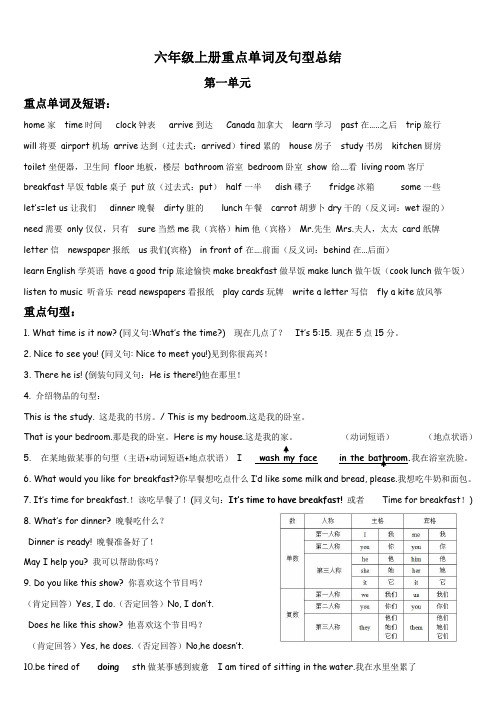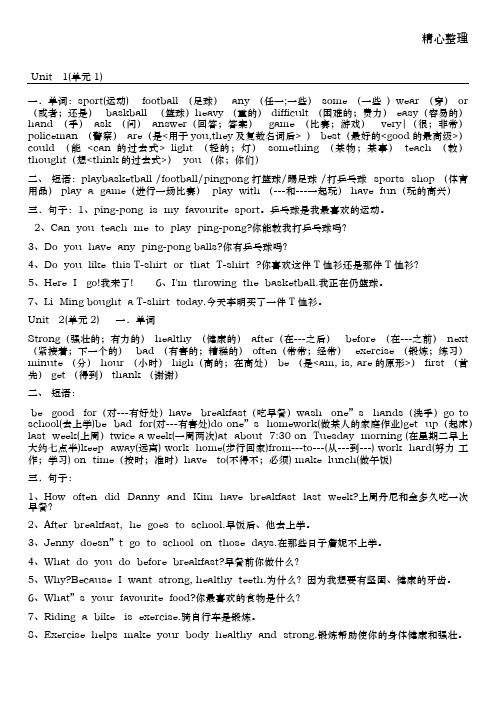小学六年级英语重点单词句型集锦
- 格式:docx
- 大小:23.78 KB
- 文档页数:16

小学英语人教精通版六年级上册重点归纳第一单元Unit 1 I go to school at 8:00重点词组:日常生活起床在早晨\上午在下午在晚上吃早餐吃午餐吃晚餐去上学回家看电视阅读睡觉做早餐散步教英语读故事每天早晨在星期六在星期日看电影上钢琴课弹钢琴在家帮助某人做家务擦门擦窗户擦地板吃午餐重点句型:1.我不是在早上七点钟吃早餐。
2.她在早上六点钟起床。
3. 她不是在早上6:30起床。
4.凯特在周六做什么?5. 她通常弹钢琴。
6.我在7:30吃早饭。
7.我在12:00吃午饭。
8.我在6:00吃晚餐。
9.你在周六干什么?10.我经常去看电影。
第二单元Unit 2 What's your hobby? 重点词组:1. 一辆新的玩具汽车2. 看一看3. 收集玩具汽车4. 收集邮票5.收集地图6. 收集卡片7. 看8. 种花9. 喝中国茶10. 去钓鱼11. 做饭12. 对……感兴趣13. 做布娃娃14. 玩电脑游戏15. 照相16.照顾好17. 谈论18.打篮球19. 寻找20. 在冬天21. 从……到……22. 在夜间23. 在世界上重点句型:1. 你爷爷的爱好是什么?2. 他的爱好是钓鱼。
3. 你对什么感兴趣?4.我对拍照感兴趣。
5. 你的爱好是什么?6. 我的爱好是收集地图。
6. 你爸爸的爱好是什么?7. 他的爱好是种花。
第三单元Unit 3 Would you like to come to my birthday party?重点词组:生日聚会放学后邀请卡邀请朋友参加聚会与朋友庆祝生日向朋友赠送生日贺卡星形蛋糕心形蛋糕水果派\水果馅饼点蜡烛唱生日歌许愿吹蜡烛切蛋糕吃蛋糕一块蛋糕重点句型:1. 你想要什么种类的蛋糕?2.我想要一个心形的蛋糕。
3. 他们怎么庆祝生日的?4. 首先,他们点燃蜡烛,然后……5.你愿意来我的生日晚会吗?6. 当然,我愿意。
7. 再见。
8.我能吃些冰激凌吗?9. 这个生日蛋糕师送给你的。

六年级英语(上)重点词汇和句型Unit 1一、重点词汇stop 停,停车站wait等,等待get to到达二、重点句型:1. How do you go to school, Sarah?◆Usually I go to school on foot. Sometimes I go by bike.◆Usually I go to school on foot, because my home is near.◆Usually I go to school by bus, because it’s fast.2. Let’s go to the park this afternoon. Great!3. How do we go to the park?4. Come to my home by bike.5. We can go to the bus stop on foot.6. Where is your home? It’s near the post office.7. Which floor? The fifth floor.8. See you at 2 o’clock. See you then.9. Look at the traffic lights. Remember the traffic rules.Stop at a red light. Wait at a yellow light. Go at a green light.10. How can I get to Zhongshan Park? You can go by the No.15 bus.Can I go on foot? Sure, if you like. It’s not far.11. There are always three lights: red, yellow and green. Red means “Stop”.Yellow means “Wait”, and green means “Go”.12. In China, drivers drive on the right side of the road.In the US, drivers drive on the right side of the road, too.In England and Australia, drivers drive on the left side of the road.13. If you go by car, by bike or on foot, you must know the traffic rules.Unit 2一、重点词汇(一)表示地点的词汇:library图书馆post office邮局hospital医院cinema电影院bookstore书店science museum科技博物馆supermarket超市bank银行shoe store鞋店(二)表示方向的词汇:north北south南east东west西turn right 右转弯turn left左转弯go straight直行(三)其它:where在哪里,到哪里please请next to 与…相邻二、重点句型1. Where is the cinema, please?It’s next to/ near the post office.It’s north/south/west/east of the post office.It’s in front of/ behind the post office.2. Excuse me, is there a cinema near here? Yes, there is./No, there isn’t.3. Is it far from here? Yes, it is./ No, it isn’t./ No, it’s not far.4. Thank you. You’re welcome.5. What are you going to do after school?I want to buy a pair of shoes.6. Get off at the cinema.7. Walk straight for three minutes.8. The hospital is on the left.9. Turn left at the cinema, then go straight. It’s on the left.10. Thank you all for coming. Happy birthday to you.11. Please come to my twelfth birthday party at 6pm on Saturday.12. Start from the bus stop in front of our school.13. Take the No. 17 bus.14. Look for me near the door.Unit 3一、重点词汇(一)表示将来时间的词汇:this morning今天上午this afternoon今天下午this evening今天晚上next week 下周tonight 今晚tomorrow明天(二)表示活动的短语:take a trip去旅行read a magazine阅读杂志go to the cinema看电影visit grandparents看望外祖父母play sports 做运动read books读书clean the room 打扫房间(三)其它:post card明信片comic book漫画书newspaper报纸magazine杂志dictionary字典buy购买二、重点句型1. What are you going to do on the weekend?I’m going to visit my grandparents this weekend.2. What are we going to do on Saturday morning?3. Who’s that? This is Liu Yun.(打电话时的用语)4. I’m going to have a busy weekend.5. I’m going to the supermarket with my mother.6. We’re going after lunch.7. That will be fun.8. I’m going to buy an English book in the bookstore.9. Can I help you?(售货员经常用的句子)10. Where are you going this afternoon? I’m going to the bookstore.What are you going to buy? I’m going to buy a comic book.When are you going? I’m going at 3 o’clock.11. Are you going to use any books?12. I’m going to buy a magazine about plants.13. I want to be a science teacher one day.Unit 4一、重点词汇ride a bike 骑自行车play the violin/piano拉小提琴/弹钢琴collect stamps集邮make a kite制作风筝dive跳水swim游泳sing唱歌dance跳舞play football踢足球listen to music听音乐play chess下棋draw pictures画画watch TV 看电视write e-mails写电子邮件相关短语:teach English/Chinese/math教英语/汉语、数学go to work去上班watch TV看电视go to bed去睡觉read newspapers读报纸go home回家at night在晚上in the evening在晚上after lunch午饭后二、重点句型1. What’s your hobby? I like collecting stamps.2. What’s his/her hobby? He/She likes playing the violin.3. There is a stamp show on Sunday.4. Can he go with us? Sure.5. We look the same, but we don’t like the same things. Tell me something about you.6. Australia must be fun.7. I live in China with my mom and dad. I don’t have a sister or brother.8. My mom is a singer. She likes swimming. My father is a TV reporter. He likeslistening to music.9. Does your penpal live in Shanghai?10. Does she teach English?Yes, she does./ No, she doesn’t. She teaches math.11. Every morning, Alice goes to school by bike.12. Her sister Ann watches cartoons on TV.13. Alice usually plays at the park on Saturday.14. I write an email to Alice every week.Unit 5salesperson销售员doctor医生nurse护士farmer农民其它方面的知识:(1)前面用an 的职业:actor/ actress, artist, engineer, accountant(2)policeman复数policemen policewoman复数policewomen 二、重点句型1. What does your mother do? She is a TV reporter.2. What does your father do? He is a teacher. He teaches English.3. What are you going to be? I’m going to be a singer.4. Who’s she? She’s my aunt.5. Who’s he? He’s my uncle.6. He is a writer. He writes the TV show for my aunt.7. How does she go to Hong Kong? She goes to Hong Kong by plane.8. How does he go to work? He goes to work by bike.9. She sells things. She is a salesperson.He helps sick people. He is a doctor.He teaches lessons. He is a teacher.She cleans streets. She is a cleaner.She draws pictures. She is an artist.10.Where does she work? She works in a car company.11. If you like drawing and math, you can be an engineer.12. He helps the bank use their money well.She often helps tourists find their way.13. He likes working with numbers.14. If you enjoy helping people, you can work for the police.Unit 61. Where does the rain come from? It comes from the clouds.2. Where does the cloud come from? It comes from the vapour.3. Where does the vapour come from? It comes from the water in the river.4. How does the water become vapour?The sun shines and the water becomes vapour.5. It’s a sunny day. He feels very hot. It may be cooler up in the sky.6. Some of his friends fall down into a lake. The sun comes out.7. Can you help me go up to the sky?10. How do we plant a flower?Plant the seeds in the soil.Put the pot in the sun.Add water often.Wait for a sprout.Wait for a flower to grow.11. How do we plant a tree?First, dig the soil.Then put the plant in the soil.Water it.Wait for it to grow.12. How do you do that?13. What should you do then.14. In several days, you can see a sprout.15. My plant has two green leaves.16. I water it every day and make sure it gets lots of sun.17. My plant is one month old. It has no flowers.六年级(上)英语作文范文一、以“My weeekend Plan”为题,写一篇不少于5句话的作文。

小学英语五六年级单词重点句型一、五六年级的重点单词:1. family(家庭)- My family is very big.(我的家庭很大。
)2. friend(朋友)- I have many friends at school.(我在学校有很多朋友。
)3. book(书)- I like reading books.(我喜欢看书。
)4. pen(钢笔)- Please give me a pen.(请给我一支钢笔。
)5. computer(电脑)- I use the computer to play games.(我用电脑玩游戏。
)6. apple(苹果)- I want to eat an apple.(我想吃一个苹果。
)7. banana(香蕉)- Can I have a banana?(我可以吃一个香蕉吗?)8. dog(狗)- I have a pet dog.(我有一只宠物狗。
)9. cat(猫)- My cat likes to sleep.(我的猫喜欢睡觉。
)10. school(学校)- I go to school from Monday to Friday.(我从星期一到星期五都去上学。
)11. teacher(老师)- My teacher is very kind.(我的老师很和蔼。
)12. student(学生)- I am a student.(我是一名学生。
)13. classroom(教室)- Our classroom is very clean.(我们的教室很干净。
)14. desk(书桌)- There is a book on my desk.(我的书桌上有一本书。
)15. chair(椅子)- Sit on the chair.(坐在椅子上。
)16. blackboard(黑板)- The teacher writes on the blackboard.(老师在黑板上写字。

第一单元重点单词及短语:home家time时间clock钟表arrive到达Canada加拿大learn学习past在…..之后trip旅行will将要airport机场arrive达到(过去式:arrived)tired累的house房子study书房kitchen厨房toilet坐便器,卫生间floor地板,楼层bathroom浴室bedroom卧室show 给….看living room客厅breakfast早饭table桌子put放(过去式:put)half一半dish碟子fridge冰箱some一些let’s=let us让我们dinner晚餐dirty脏的lunch午餐carrot胡萝卜dry干的(反义词:wet湿的)need需要only仅仅,只有sure当然me我(宾格)him他(宾格)Mr.先生Mrs.夫人,太太card纸牌letter信newspaper报纸us我们(宾格) in front of在….前面(反义词:behind在…后面)learn English学英语have a good trip旅途愉快make breakfast做早饭make lunch做午饭(cook lunch做午饭)listen to music 听音乐read newspapers看报纸play cards玩牌write a letter写信fly a kite放风筝重点句型:1. What time is it now? (同义句:What’s the time?) 现在几点了?It’s 5:15. 现在5点15分。
2. Nice to see you! (同义句: Nice to meet you!)见到你很高兴!3. There he is! (倒装句同义句:He is there!)他在那里!4. 介绍物品的句型:This is the study. 这是我的书房。
/ This is my bedroom.这是我的卧室。

六年级下册英语重点单词句子一、重点单词。
1. younger [ˈjʌŋɡə(r)] 形容词(adj.),比较级形式,意为“更年轻的;更幼小的”。
2. older [ˈəʊldə(r)] 形容词(adj.),比较级形式,意为“更年长的;更旧的”。
3. taller [ˈtɔːlə(r)] 形容词(adj.),比较级形式,意为“更高的”。
4. shorter [ˈʃɔːtə(r)] 形容词(adj.),比较级形式,意为“更短的;更矮的”。
5. longer [ˈlɒŋɡə(r)] 形容词(adj.),比较级形式,意为“更长的”。
6. thinner [ˈθɪnə(r)] 形容词(adj.),比较级形式,意为“更瘦的”。
7. heavier [ˈheviə(r)] 形容词(adj.),比较级形式,意为“更重的”。
8. bigger [ˈbɪɡə(r)] 形容词(adj.),比较级形式,意为“更大的”。
9. smaller [ˈsmɔːlə(r)] 形容词(adj.),比较级形式,意为“更小的”。
10. stronger [ˈstrɒŋɡə(r)] 形容词(adj.),比较级形式,意为“更强壮的”。
11. yesterday [ˈjestədeɪ] 名词(n.),意为“昨天”。
12. last [lɑːst] 形容词(adj.),意为“上一个的;刚过去的”;也可作动词(v.),意为“持续”。
13. before [bɪˈfɔː(r)] 介词(prep.)/副词(adv.),意为“在……之前”。
14. hotel [həʊˈtel] 名词(n.),意为“旅馆”。
15. fixed [fɪkst] 动词(v.),fix的过去式,意为“修理;固定”。
16. broken [ˈbrəʊkən] 形容词(adj.),意为“破损的;弄坏了的”。
17. lamp [læmp] 名词(n.),意为“台灯”。

精心整理Unit 1(单元1)一.单词:sport(运动) football (足球) any (任一;一些) some (一些 )wear (穿) or (或者;还是) baskball (篮球)heavy (重的) difficult (困难的;费力) easy (容易的) hand (手) ask (问) answer (回答;答案) game (比赛;游戏) very|(很;非常) policeman (警察) are (是<用于you,they 及复数名词后> ) best (最好的<good 的最高级>) could (能 <can 的过去式> light (轻的;灯) something (某物;某事) teach (教) thought (想<think 的过去式>) you (你;你们)二、 短语:playbasketball /football/pingpong 打篮球/踢足球 /打乒乓球 sports shop (体育用品)2、3、4、5、7、Unit 2(Strong next minute (首先) get 二、 be go to school((起床)努力 工作;学习1、早餐?2、After breakfast, he goes to school.早饭后、他去上学。
3、Jenny doesn ”t go to school on those days.在那些日子詹妮不上学。
4、What do you do before breakfast?早餐前你做什么?5、Why?Because I want strong, healthy teeth.为什么?因为我想要有坚固、健康的牙齿。
6、What ”s your favourite food?你最喜欢的食物是什么?7、Riding a bike is exercise.骑自行车是锻炼。
小学六年级英语语法知识点汇总语法的学习,需要付出大量的时间和精力。
马上要到(毕业)考试了,为了帮助大家掌握小学英语的基础知识点.接下来是为大家整理的小学(六班级英语)语法知识点汇总,希望大家喜欢!小学六班级英语语法知识点汇总一一、重点(短语):this morning 今天上午this afternoon 今天下午this evening 今天晚上next week 下周tomorrow 明天tonight 今晚post card 明信片comic book漫画书newspaper报纸二、重点句型:1.What are you going to do on the weekend?你周末打算做什么?2.I’m going to visit my grandparents this weekend?这个周末我打算去看望我的外祖父母。
3.Where are you going this afternoon? 你今天下午打算去哪里?4.I’m going to the bookstore.我打算去书店。
5.What are you going to buy?你打算去买什么?6.I’m going to buy a comic book.我打算去买一本漫画书。
三、重点语法:1、What are you going to do?你想做什么?询问他人在未来的打算。
be going to 后面要跟动词的原形。
注意be going to be 意思是打算成为什么,干什么职业。
注意一下(句子)的区别,找出正确回答。
What are you going to do this afternoon?What are you going to buy?What are you going to be?When? are you going?Where are you going?How are you going?Who are you going with?2、this evening 和tonight的区别:this evening指的是今天晚上睡觉以前的时间,一般指晚上十二点以前。
6Aunit 1 public signs知识点:知识点:1 标志语:标志语:○1以No 开头的,表示禁止做某事,后面要用ing 形式,如:No swimming.○2以don don’’t 或者或者do not 开头的,也表示禁止做某事,不过后面动词要用原型(秦淮一中心小学期中考试,完型填空和填空题目考到)如:Do not touch.○3以动词原形开头的,如:Be quiet. 2情态动词情态动词○1must,would should,can,may 都是情态动词;must 表示必须一定要做的事情;would 表示想要做的事情,would like to do sth ;should (shouldn shouldn’’t )表示应该或不应该;can 表示能够,会做某事;may 表示可以或允许做某事。
表示可以或允许做某事。
○2情态动词,没有人称和数的变化,后面都跟动词原型。
情态动词,没有人称和数的变化,后面都跟动词原型。
○3变成一般疑问句,将情态动词提到句子开头。
变成一般疑问句,将情态动词提到句子开头。
○4变成否定句,在后面加not ,有的可以缩写:should not= shouldn should not= shouldn’’t, can not=can can not=can’’t would not=wouldn would not=wouldn’’t will not =won will not =won’’t重点句型:重点句型:1 ————What does it /this/that/mean? 它/这个/那个是什么意思?那个是什么意思?It means you /wemust/should/shoudn It means you /wemust/should/shoudn’’t..意思是你/我们必须/应当/不应该。
解析:解析:当你不知道一个标志、一个词语或者一句话的意思时,可以用这句话来询问。
小学六年级英语(上册)知识归纳|人教版Unit 1 How do you go to school?一、重点短语:by plane 坐飞机by ship 坐轮船on foot步行by bike 骑自行车by bus 坐公共汽车by train 坐火车trafficlights交通灯traffic rules交通规则go to school 去上学get to 到达get on上车get off下车Stop at a red light. 红灯停Wait at ayellow light. 黄灯等Go at a green light. 绿灯行二、重点句型:1.How do you go to school?你怎么去上学?ually I go to school on foot. SometimesI go by bus.通常我步行去上学。
有时候骑自行车去。
3.How can I get to Zhongshan Park ?我怎么到达中山公园?4.You can go by the No. 15 bus. 你可以坐15路公共汽车去。
三、重点语法:1、There are many waysto go somewhere.到一个地方去有许多方法。
这里的ways一定要用复数。
因为there are是There be句型的复数形式。
2、on foot 步行乘坐其他交通工具大都可以用介词by…,但是步行只能用介词on 。
4、go to school的前面绝对不能加the,这里是固定搭配。
5、USA 和US 都是美国的意思。
另外America也是美国的意思。
6、go to the park 前面一定要加the. 如果要去的地方有具体的名字,就不能再加the ,如果要去的地方没有具体名字,都要在前面加the. (go to school除外。
)7、How do you go to …?你怎样到达某个地方?如果要问的是第三人称单数,则要用:How does he/she…go to …?8、反义词:get on(上车)---get off(下车)near(近的)—far(远的)fast(快的)—slow(慢的)because(因为)—why(为什么)same(相同的)—different(不同的)9、近义词:see you---goodbye sure---certainly---ofcourse10、频度副词:always 总是,一直usually 通常often经常sometimes 有时候never 从来不Unit 2 Where is the science museum?一、重点短语:library 图书馆post office 邮局hospital医院cinema 电影院bookstore书店science museum科学博物馆turnleft向左转turn right 向右转go straight 直行north北south南east东west西next to靠近、与……。
小学六年级英语重点单词句型集锦衣服(clothes):jacket夹克衫shirt衬衫T-shirt丅恤衫skirt短裙子dress 连衣裙jeans牛仔裤pants长裤socks袜子shoes鞋子sweater毛衣coat上衣raincoat雨衣shorts短裤sneakers 网球鞋slippers拖鞋sandals凉鞋boots靴子hat(有沿的)帽子cap便帽sunglasses太阳镜tie领带scarf围巾glo*es 手套trousers裤子cloth布交通工具(*ehicles):bike自行车bus公共汽车train火车boat小船ship轮船yacht快艇car小汽车taxi出租车jeep吉普车*an小货车;面包车plane/airplane飞机subway/underground地铁motor cycle摩托车杂物(other things): window窗户door门desk课桌chair椅子bed床computer计算机board写字板fan风扇light灯teacher’s desk讲台picture图画;照片wall墙壁floor地板curtain窗帘trash bin垃圾箱closet壁橱mirror镜子end table床头柜football/soccer足球present礼物walkman 随身听lamp台灯phone电话sofa沙发shelf书架fridge 冰箱table桌子TV电视air-conditioner空调key钥匙lock锁photo照片chart图表plate盘子knife刀fork叉spoon勺子chopsticks筷子pot锅gift礼物toy玩具doll洋娃娃ball球balloon气球kite风筝jigsaw puzzle拼图游戏box盒子umbrella伞zipper拉链*iolin小提琴yo-yo溜溜球nest鸟窝hole洞tube管子toothbrush牙刷menu 菜单e-card电子卡片e-mail电子邮件traffic light交通灯money钱medicine药地点(locations):home家room房间bedroom卧室bathroom卫生间li*ing room 起居室kitchen厨房classroom教室school学校park公园library图书馆post office邮局police office警察局hospital医院cinema电影院bookstore书店farm农场zoo 动物园garden花园study书房playground操场canteen食堂teacher’s office教师办公室library图书馆gym体育馆washroom卫生间art room绘画教室computer room计算机教室music room音乐教室TV room电视机房flat公寓company公司factory工厂fruit stand水果摊pet shop宠物商店nature park自然公园theme park主题公园science museum科学博物馆the Great Wall长城supermarket超市bank银行country国家*illage乡村city城市hometown家乡bus stop 公交车站课程(classes):sports体育运动science科学Moral Education思想品德课Social Studies社会课Chinese语文math数学PE体育课English英语课国家、城市(countries & cities):China/PRC中国America/USA美国UK联合王国England英国Canada/CAN加拿大Australia澳大利亚New York纽约London 伦敦Sydney悉尼Moscow莫斯科Cairo开罗气象(weather):cold寒冷的warm温暖的cool凉爽的snowy 下雪的sunny晴朗的hot炎热的rainy下雨的windy有风的cloudy多云的weather report天气预报景物(nature):ri*er河流lake湖泊stream河;溪forest森林path小道road公路house房子bridge桥building建筑物rain雨cloud云sun太阳mountain山sky天空rainbow彩虹wind 风air空气moon月亮植物(plants):flower花grass草tree树seed种子sprout苗plant植物rose玫瑰leaf叶子星期(week):Monday星期一Tuesday星期二Wednesday星期三Thursday星期四Friday星期五Saturday星期六Sunday星期天weekend周末月份(months):Jan. (January)一月Feb.(February)二月Mar.(March)三月April四月May五月June六月July七月Aug.(August)八月Sept.(September)九月Oct.(October)十月No*.(No*ember)十一月Dec.(December)十二月季节(seasons):spring春summer夏fall/autumn秋winter冬方位(directions):south南north北east东west西left 左边right右边患病(illness):ha*e a fe*er发烧hurt疼痛ha*e a cold感冒ha*e a toothache牙疼ha*e a headache头疼ha*e a sore throat喉咙疼数词(numbers):one一two二three三four四fi*e五six六se*en七eight八nine九ten十ele*en十一twel*e十二thirteen 十三fourteen十四fifteen十五sixteen十六se*enteen十七eighteen十八nineteen十九twenty二十thirty三十forty四十fifty五十sixty六十se*enty七十eighty八十ninety九十forty-two四十二hundred百one/a hundred and thirty-six一百三十六first第一second第二third第三fourth第四fifth第五eighth第八ninth第九twelfth第十二twentieth第二十thirtieth第三十fortieth第四十fiftieth第五十sixtieth第六十se*entieth第七十eightieth第八十ninetieth第九十fifty-sixth第五十六big大的small小的long长的tall高的short短的;矮的young年轻的old旧的;老的strong健壮的thin瘦的acti*e 积极活跃的quiet安静的nice好看的kind和蔼亲切的strict严格的smart聪明的funny滑稽可笑的tasty好吃的sweet甜的salty咸的sour酸的fresh新鲜的fa*ourite最喜爱的clean干净的tired疲劳的excited兴奋的angry生气的happy高兴的bored无聊的sad忧愁的taller更高的shorter更矮的stronger更强壮的older年龄更大的younger 更年轻的bigger更大的hea*ier更重的longer更长的thinner更瘦的smaller更小的good好的fine好的great很好的hea*y 重的new新的fat胖的happy快乐的right对的hungry饥饿的cute逗人喜爱的little小的lo*ely可爱的beautiful漂亮的colourful色彩鲜艳的pretty漂亮的cheap便宜的expensi*e昂贵的juicy多汁的tender嫩的healthy健康的ill有病的helpful有帮助的high高的easy 简单的proud骄傲的sick有病的better更好的higher更高的介词(prep.):in在……里on在……上;在……时候under在……下面near 在……的旁边behind在……后边next to与……相邻o*er 在……上面in front of在……前面I我we我们you你;你们he他she她it它they他(她,它)们my我的our 我们的your你的;你们的his他的her她的动词(*.):play(.ed)玩;踢swim(swam)游泳skate滑冰fly(flew)飞jump跳walk走run(ran)跑climb爬fight(fought)打架swing(swung)荡eat(ate)吃sleep(slept)睡觉like像,喜欢ha*e(had)有;吃turn转弯buy(bought)买take(took)买;带li*e居住teach(taught)教go(went)去study(studied)学习learn学习sing(sang)唱歌dance跳舞row划do(did)做do homework做作业do housework做家务watch TV看电视read(read) books读书cook the meals做饭water the flowers 浇花sweep(swept) the floor扫地clean the bedroom打扫卧室make(made) the bed铺床set(set) the table摆饭桌wash the clothes洗衣服do the dishes洗碗碟use a computer使用计算机do morning exercises晨练;做广播操eat breakfast吃早饭eat dinner吃晚饭go to school上学ha*e English class 上英语课play sports进行体育运动get(got)up起床climb mountains爬山go shopping买东西play the piano弹钢琴*isit grandparents看望(外)祖父母go hiking去远足fly kites放风筝make a snowman堆雪人plant trees种树draw(drew) pictures画画cook dinner做饭read a book看书answer the phone接电话listen to music听音乐clean the room打扫房间write(wrote) a letter写信write an e-mail写电子邮件drink(drank) water喝水take pictures照相watch insects观察昆虫pick up lea*es采摘树叶do an experiment 做实验catch butterflies捉蝴蝶count insects数昆虫collect insects收集昆虫collect lea*es收集树叶write a report写报告play chess下棋ha*e a picnic举行野餐get to到达ride(rode) a bike骑自行车play the *iolin拉小提琴make kites制作风筝collect stamps集邮meet(met)见面welcome欢迎thank谢谢lo*e爱work工作drink(drank)喝taste尝smell闻feed(fed)喂养shear剪milk挤奶look 看guess猜help帮助pass传递show展示use使用clean 打扫open打开close关上put放paint绘画tell(told)告诉kick踢bounce反弹ride(rode)骑stop(stopped)停wait等find(found)寻找到dri*e(dro*e)驾驶fold折send(sent)寄wash洗shine照耀become变成feel(felt)感觉到think(thought)思考meet(met)遇见fall(fell)落下lea*e(left)离开wake(woke) up醒来put on穿上take off脱掉hang up挂起wear(wore)穿go home回家go to bed上床睡觉play computer games玩电脑游戏play chess下棋empty the trash倒垃圾put away the clothes收拾衣服get off下车take a trip去旅行read a magazine读杂志go to the cinema 去看电影go straight向前直走十:小学三至六年级英语四会单词、句子汇总四年级上册Unit 4:home room school classroom door chair bed desk window Unit 5:bread egg milk water rice beef chicken fishUnit 6:sister brother father mother farmer dri*er nurse doctor四年级下册Unit 1:computer board fans light teacher’s desk picture floor wallThis is my computer. That is your computer. Is this a teacher’s desk? Yes, it is.Unit 2: one two three four fi*e six se*en eight nine ten English P.E. music math ChineseWhat time is it? It’s two o’clock.. It’s 9:45. It’s time for math class.Unit 3: red blue yellow green white skirt shirt jacket dress Is this your T-shirt? No, it’s not. What colour is it? It’s white.Unit 4:jeans pants socks shoes sunny warm cold snowyIt’s warm today. Let’s play football. It’s cool. Is itcold?Unit 5:big small long short nice apple banana pear watermelon How much is it? It’s ten yuan. How much are they? They’re three yuan.Unit 6:cat raadfdsit pig duck dog ele*en twel*e fifteen thirteen twentyAre they ducks? No, they aren’t. How many horses are there? Twel*e.五年级上册Unit 1: young funny tall strong kind old short thin smart acti*e strict quietWho’s your English teacher? Mr Carter. What’s he like? He’s tall and strong.Is she quite? No, she isn’t. She’s *ery acti*e. Is she strict? Yes, she is, but she’s *ery kind.Unit 2: Monday (Mon.) Tuesday (Tue.) Wednesday (Wed.) Thursday (Thu.) Friday (Fri.)Saturday (Sat.) Sunday (Sun.) day ha*e do homework watch TV read booksWhat day is it today? It’s Wednesday. We ha*e English, math and science on Thursdays.What do you ha*e on Thursday? What do you do on Saturdays? Iwatch TV on Saturdays.Unit 3: eggplant fish green beans tofu potato tomato lunch tasty sweet sour fresh salty fa*ourtie fruit grapeWhat do you ha*e for lunch on Mondays? We ha*e tomatoes, tofu and fish.What’s your fa*ourite fruit? I like apples. They’re sweet.I like fruit. But I don’t like grapes. They’re sour.Unit 4: cook the meals water the flowers sweep the floor clean the bedroom make the bed set the table wash the clothes do the dishes use a computerWhat can you do? I can sweep the floor. I can cook the meals.I can water the flowers.Can you make the bed? No, I can’t. Can you use a computer? Yes, I can.Unit 5: curtain trash bin closet mirror end table bedroom kitchen bathroom li*ing room clothes in on under near o*er behindThe trash bin is behind the door.There are two bedrooms, a kitchen, a bathroom and a li*ing room.There is a mirror, a bed and a big closet. The closet is near the table. Many clothes are in the closet.Unit 6: mountain ri*er flower grass lake forest path park house bridgetree road building anyIs there a forest in the park? Yes, there is. Is there a ri*er? No, there isn’t.五年级下册Unit 1: do morning exercises eat breakfast ha*e English class play sports eat dinnerget up climb mountains go shopping play the piano *isit grandparents go hiking usually often sometimesWhen do you eat dinner? I eat dinner at 7:00 in the e*ening. When do you get up? I usually get up at 12:00 at noon. What do you do on the weekend? Usually I watch TV and go shopping. Sometimes I *isit my grandparents.What about you? I often play football. Sometimes I go hiking. Unit 2: spring summer fall winter season which best swim fly kites sleep skatemake a snowman plant trees why becauseWhich season do you like best? I like winter best. Summer is good, but fall is my fa*ourite season.Why do you like summer? Because I can swim in the lake. Why do you like winter? Because I can sleep a long time.Unit 3: January (Jan.) February (Feb.) March (Mar.) April (Apr.) May June July August (Aug.) September (Sept.) October (Oct.) No*ember (No*.) December (Dec.) birthday uncle her dateWhen is your birthday? It’s in May. My birthday is in June. Uncle Bill’s birthday is in June, too.Is her birthday in June? Yes. What’s the date? June 9th . Unit 4: draw pictures cook dinner read a book answer the phone study momlisten to music clean the room write a letter write an e-mail grandpaHi, John. This is Zhang Peng.What are you doing? I’m doing the dishes. I’m reading a book. Grandpa is writing a letter.Brother is doing homework. Mom is cooking dinner in the kitchen. He’s writing an e-mail in the study.Unit 5: fly jump walk run swim kangaroo sleep climb fight swing drink waterWhat is it doing? It’s eating bananas. What is she doing? She’s jumping.What are they doing? They’re swimming. They’re climbing trees.Unit 6: take pictures watch insects pick up lea*es do an experiment catch butterflies count insects collect lea*es write a report play chess ha*e a picnic honeyAre you eating lunch? No, we aren’t. Are they eating the honey? Yes, they are.Is he playing chess? Yes, he is. Is she counting insects? No, she isn’t.六年级上册Unit 1: on foot by bike by bus by train by plane by ship go to schooltraffic light traffic rule get to stop waitHow do you go to school, Sarah? Usually I go to school on foot. Sometimes I go by bike.How can I get to Zhongshan Park? You can go by the No.15 bus. Unit 2: library hospital cinema bookstore where please post office next toturn right turn left go straight thenWhere is the cinema, please? It’s next to the hospital. Turn left at the cinema, then go straight. I t’s on the left.Unit 3: next week this morning this afternoon this e*ening comic bookpost card newspaper buyWhat are you going to do on the weekend? I’m going to *isit my grandparents this weekend.Where are you going this afternoon? I’m going to the bookstore.What are you going to buy? I am going to buy a comic book. Unit 4: hoadfdsy di*e li*e teaches watches goes does doesn’t=does notride a bike play the *iolin make kites collect stamps What’s your hoadfdsy? I like collecting stamps. He likes collecting stamps, too.Does she teach English? No, she doesn’t. Does she teach you math? Yes, she does.Unit 5: singer writer actor actress artist TV reporter engineeraccountant policeman cleaner salesperson workWhat does your mother do? She is a TV reporter.Where does she work? She works in a school.How does she go to work? She goes to work by bus.Unit 6: rain cloud sun stream come from seed soil sprout plant should thenWhere does the rain come from? It comes from the clouds. How do you do that? What should you do then?六年级下册Unit 1: taller shorter stronger older younger bigger hea*ier longer thinner smallerHow tall are you? I’m 164 cm tall. You’re shorter than me. You’re 4 cm taller than me.How hea*y are you? I’m 48 kg. I’m thinner and shorter than youUnit 2: ha*e a fe*er ha*e a cold ha*e a toothache ha*e a headache ha*e a sore throathurt matter sore nose tired excited angry happy bored sad What’s the matter? My throat is sore. My nose hurts.How are you, Liu Yun? You look so happy. How are you, Sarah? You look sad today.Unit 3: watch-watched wash-washed clean-cleaned play-played *isit-*isited do-didgo-went read – read last weekend went fishing went hiking What did you do last weekend? I played football.Did you read books? Yes, I did. / No, I didn’t.Unit 4: learn Chinese-learned Chinese sing – sang dance –danced eat good food – ate good foodtake pictures – took pictures climb a mountain – climbed a mountain get to – got torow a boat – rowed a boat see elephants – saw elephants went skiing went ice-skatingbuy presents – bought presents ha*e – hadWhere did you go on your holiday? I went to Xinjiang.How did you go there? I went by train.网络搜集整理,仅供参考。